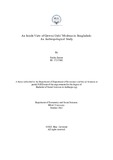An inside view of Qawmi girls’ madrasa in Bangladesh: An anthropological study
Abstract
This research paper provides an idea of Qawmi Girls’ madrasa in Bangladesh, demonstrating
the construction of Muslim womanhood based on moral guidance and the devoted lifestyles
of the madrasa’s female students. As a result of madrasa education, Muslim women’s
participation in religious institutions and forums increases, raising the possibility of a bigger
impact on religious life, My focus for this paper is to present an in-depth examination of
madrasa’s impact on their female students’ post-madrasa work choices; how madrasa
education enlightens females about various social and state activities that occur at various
times; and how these social events affect madrasa girls. For this research some former
students and graduates have been interviewed with a number of current madrasa students to
present a full picture of the madrasa transforming function in its students’ socio-religious
lives, highlighting the importance of the ties between the madrasa and social life. This thesis
paper examines if ideology plays a more important role in the formation of the religious and
denominational alignment of the female madrasa in Bangladeshi society, as well as the
working-class status of the girls and their parents based on literature, in-depth interviews, and
observations. With limited resources, the madrasa instills a fresh understanding of religious
responsibilities and common obligations towards society in the female students, as well as
their localities, larger communities, and careers.

